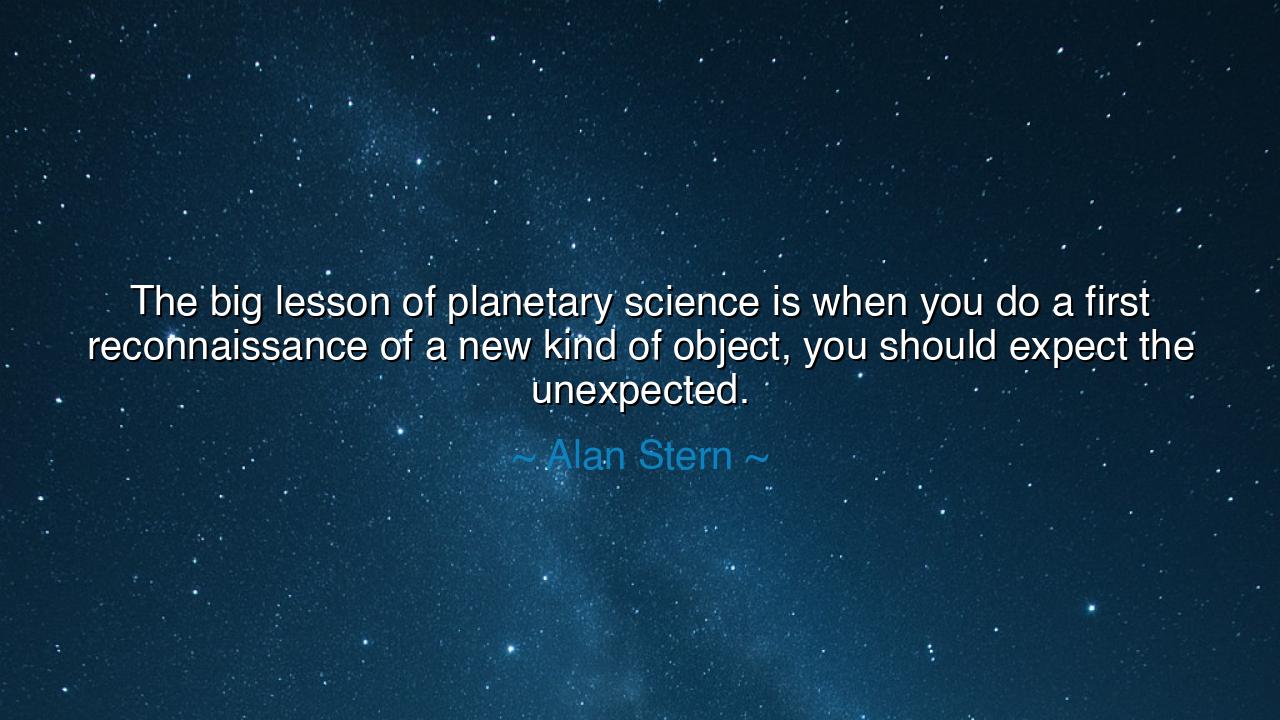
The big lesson of planetary science is when you do a first
The big lesson of planetary science is when you do a first reconnaissance of a new kind of object, you should expect the unexpected.






"The big lesson of planetary science is when you do a first reconnaissance of a new kind of object, you should expect the unexpected." These words from Alan Stern echo the profound truth that when we venture into the unknown, whether in science, discovery, or life itself, we must prepare not for what we expect, but for what lies beyond our imagining. The unexpected is not a mere possibility—it is a certainty. In planetary science, as in life, when we set out to explore new realms, we must relinquish the illusion that we can fully anticipate what we will find. Just as the ancient mariners set sail across vast, uncharted seas, hoping to find the fabled lands of fortune, so too must the modern scientist venture forth with humility and an open mind, ready to confront the unknown with courage and wonder.
In the ancient world, the unknown was a realm both feared and revered. Homer, in his epic tales, chronicled the journeys of Odysseus, who encountered gods, monsters, and mystical islands on his travels. Each step into the unknown was fraught with peril, but it was also a path of great discovery. Odysseus did not sail into the unfamiliar with certainty; he sailed with the awareness that the unexpected would shape his fate. In the same way, when Stern speaks of planetary science, he reminds us that the greatest revelations often arise from those very places where we least expect them. The stories of the ancient explorers are not just tales of physical journeys; they are metaphors for the inner journey of discovery, where the unexpected becomes the guiding force of progress.
Consider the remarkable voyage of Columbus—when he sailed across the Atlantic, he believed he was heading toward the riches of Asia, but instead, he stumbled upon an entirely new world, the Americas. This was the ultimate example of expecting the unexpected. Columbus did not set out with the knowledge that he would change the course of history, but he embraced the unknown with courage and an open heart. Just as Columbus’s journey reshaped the world’s maps, so too does planetary science reshape our understanding of the universe. Every exploration, whether of new lands or distant planets, invites the unexpected to reveal itself, offering wisdom and wonder beyond what we ever imagined.
In modern planetary science, this lesson is echoed in the discoveries made by missions like NASA’s Voyager or the New Horizons mission to Pluto. When New Horizons passed by Pluto in 2015, it unveiled a world far more complex than scientists had anticipated—a planet with vast ice plains, towering mountains, and an atmosphere that defied expectations. The unexpected nature of Pluto was a reminder that even after decades of observation, the universe still holds surprises that challenge our understanding. This moment in scientific history mirrors the words of Stern—the first reconnaissance of a new world often yields wonders that far exceed what we had hoped to find.
This spirit of discovery is present not just in science, but in every endeavor that requires us to step into the unknown. Consider the story of Marie Curie, whose groundbreaking work in radioactivity arose from a place of uncertainty. She did not know that her work would lead to the discovery of radiation, nor did she foresee the potential dangers that would later emerge. Yet her willingness to embrace the unknown—her readiness to face the unexpected—made her one of the most influential scientists of all time. Curie’s journey was not one of following the expected path, but of venturing into the unknown with both humility and determination.
The lesson here, dear ones, is that in the pursuit of knowledge, we must not simply aim to answer questions we already know how to ask. Instead, we must embrace the mystery and uncertainty that come with exploration. Whether in science, art, or life, the most profound discoveries often arise when we least expect them. The universe is full of wonders that we cannot predict, and it is only through venturing into the unknown with openness and curiosity that we can uncover those mysteries. As Stern reminds us, every time we look to the stars or explore new frontiers, we should not be surprised when we encounter the unexpected. Instead, we should welcome it, for it is through the unexpected that we learn, grow, and move closer to a deeper understanding of the world and ourselves.
In your own life, let this lesson guide you. Do not approach your goals with the belief that you already know the answers. Embrace the unexpected. Whether you are embarking on a new career, learning a new skill, or exploring the world around you, prepare yourself for the surprises that await. Just as planetary science leads us to discoveries that reshape our understanding of the universe, so too can life offer us profound insights when we remain open to the unexpected moments that arise. Recognize that the unknown is not something to fear, but something to celebrate—for in it lies the potential for true discovery and transformation.






AAdministratorAdministrator
Welcome, honored guests. Please leave a comment, we will respond soon